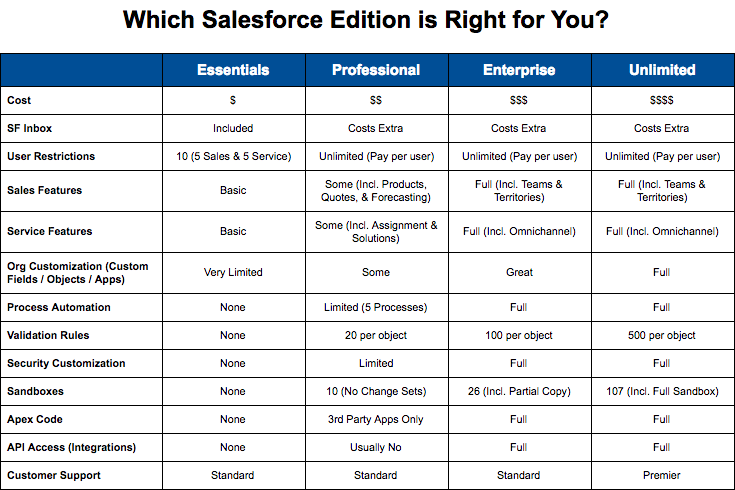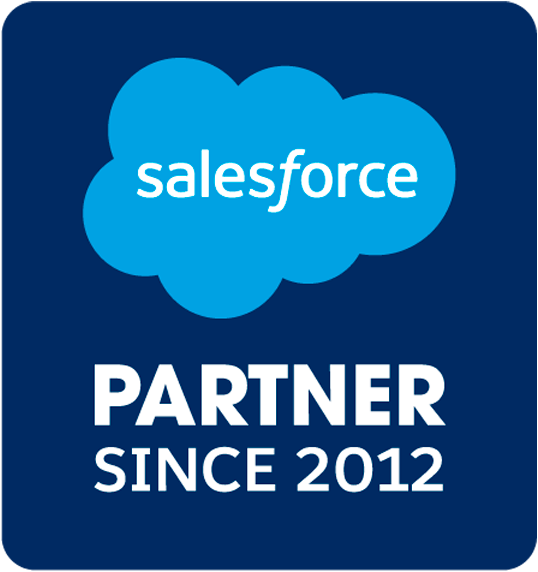Recent research indicates that small businesses aren’t investing in CRMs as much as they should. After all, CRMs can give companies almost $9 back on every $1 spent and can boost customer retention by 27%, and yet 35% of small businesses don’t implement a CRM in their first five years.
The truth is, many small businesses feel they either don’t need a CRM or can’t afford one. But the CRM giant Salesforce may have changed that thinking for many with the release of Salesforce Essentials. The product offers a low-cost, easy-to-use platform to any SMB still stuck tracking their relationships on spreadsheets.
However, many small businesses still don’t know what the release of Essentials means to them. This blog takes you through everything you need to know about it — what it does and doesn’t give you.
Salesforce Essentials Pricing:
We’ll start with the most salient point for many small businesses: its price. At $25 per user per month, Salesforce Essentials costs $50 less than any other SF edition and less than most other competitors. This fact alone should provide a compelling enough reason for many companies to begin investing in the Salesforce platform.
In-App Guidance:
95% of small businesses say that ease of use serves as a chief concern when evaluating new technology. That’s why Salesforce decked Essentials out with guidance and training features unique to this edition. For example, it comes with a handy setup assistant that takes you through everything needed to customize the product to your needs. The CRM also links to Salesforce’s Trailhead learning system right on its home screen, providing targeted content to you and your team whenever you need it.
In short, Essentials represents the first version of Salesforce you don’t need a consulting partner or prior knowledge for. Within a day of taking it out of the box, you and your team can start benefiting from all of the features it offers.
Connected Productivity Features:
Salesforce also built Essentials with the productivity needs of your team in mind. Small businesses spend 23% of their days manually entering data, and Salesforce sought to change that. So Essentials connects with Outlook and Gmail thanks to Salesforce Inbox. It also comes with Einstein Activity Capture, which automatically attaches emails and calendar events to Salesforce records. Finally, the company also provides all Essentials customers with its G Suite Connector for three months, allowing you to connect files and Google-based communications to your new CRM.
If that’s not enough, the Salesforce AppExchange offers a dedicated small business page with other add-ons that might fit your needs. Just make sure the products you use all connect with Essentials!
{{cta('4a895691-478c-4151-89d6-d5f48e5b369b')}}
Salesforce Essentials Limitations:
Essentials offers a lot for a small price tag, but its focus on small organizations results in some limitations. Most noticeably, Salesforce designed each Essentials product (Sales and Services) for teams of 5 users or fewer — if you need more licenses than that, you’ll need to upgrade to Professional Edition.
To promote ease of use, Salesforce has also removed many of its more advanced features from Essentials. Below is a list of features that Essentials does not include (across Sales and Service):
- Automation rules like processes and workflows
- Record types
- Lead assignment and routing
- Campaign management
- Forecasting
- Products and quoting
- Advanced Service Cloud features like Omnichannel, SLAs, and entitlements
- Person Accounts
- Sandboxes
- Security features like roles and permissions
- API access

So, if you previously used a more robust version of Salesforce at a different company and now expect the same functionality, then Professional or Enterprise Edition may serve you better. You should think of Essentials’ target market, instead, as those new to the CRM world who are trying to ease their way into it.
In all, Salesforce Essentials offers small businesses a low-cost way to get started with a CRM. Its pricing and ease of use allow these teams to save time and better organize their data, while the scalability of the Salesforce platform ensures that they can grow their CRM as fast as they need to.
Any questions about Essentials and what it might mean for your business? Comment below to let us know!



